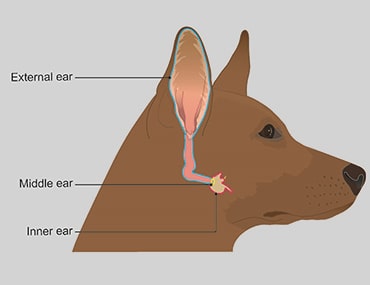Ears problems in dogs - an overview
Overview
- There are many different ear problems that can affect dogs – this article gives an overview of some of the most common.
- Ear problems tend to cause swelling, redness, pain, a bad smell, itchiness, and head shaking.
- Severe ear problems that affect deep inside the ear can also cause symptoms such as loss of balance, a head tilt, and flickering eye movements.
- Always contact your vet if you think your dog might have an ear problem.
Common ear problems in dogs
Some of the most common ear conditions in dogs are:
- Ear infections – an irritating and painful overgrowth of bacteria or yeast inside the ear.
- Allergic skin disease – an extremely common cause of ear problems in dogs.
- Ear mites – tiny parasites that cause very itchy ears and often lead to infections.
- Aural haematoma – a blood blister inside the earflap that causes it to balloon in size, become hot, red and droopy.
- Vestibular disease – a condition that affects the inner ear and causes a loss of balance, a head tilt, flickering eye movements and makes a dog feel as though everything is spinning around them (just like vertigo in people).
- Ear injuries – such as wounds, bites or knocks.
- Ear growths, polyps and tumours – cancerous and non-cancerous
- Foreign objects stuck in the ear – such as grass seeds
- Severe allergic reactions – if both your dog’s ears suddenly become very swollen, red and puffy, and they have swelling elsewhere (such as their face, eyes, nose or feet) this could be a the beginning of a severe allergic reaction to something. If you think this is the case, call your vet immediately.
Symptoms of an ear problem
There are three main parts to the ear, the ‘outer’, ‘middle’ and ‘inner’ – see image below. If your dog is suffering from a problem with their outer ear (the ear flap and/or ear canal), they are likely to have one (or more) of the following symptoms:
- Heat, swelling, itchiness and pain
- A bad smell from the affected ear(s)
- Head shaking and face rubbing
- A swollen, droopy earflap
- Discharge, dirt, excess wax or blood from the affected ear(s)
If your dog is suffering from a problem affecting deeper inside the ear (the middle or inner ear), they may also show the following signs:
- A head tilt
- Loss of balance
- Flickering eye movements

There are three main parts to a dog’s ear, the ‘outer’, ‘middle’ and ‘inner’. The outer ear (in blue) is made up of the earflap and ear canal, and collects sound. The middle ear (in pink) transmits sounds, and the inner ear (in yellow) is responsible for hearing and balance.
Dog breeds prone to ear disease
Any dog can develop an ear problem, but certain breeds are more prone, often due to the shape of their ear, the amount of hair they have inside their canal, or an increased tendency to skin problems. Breeds with an increased risk of ear problems include:
Published: Oct 2021
Did you find this page useful?
Tell us more
Please note, our vets and nurses are unable to respond to questions via this form. If you are concerned about your pet’s health, please contact your vet directly.
Thank you for your feedback
Want to hear more about PDSA and get pet care tips from our vet experts?
Sign up to our e-newsletter
Written by vets and vet nurses. This advice is for UK pets only. Illustrations by Samantha Elmhurst.

